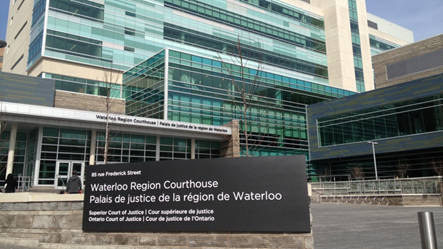 Standing ovations and cake are not something we typically expect to see in a courtroom, but for the 15 graduates of the Drug Treatment Court (DTC) in the Waterloo region, this is a rite of passage. “Drug Treatment Court combines addiction treatment services with justice system case management using a non-adversarial approach,” explained Sharon Deally-Grzybowski, Manager of Mental Health and Justice Services at CMHA Waterloo Wellington Dufferin. The court provides access to drug, alcohol and other treatment and rehabilitation services as well as supporting services including mental health treatment, trauma, family therapy and job skills training.
Standing ovations and cake are not something we typically expect to see in a courtroom, but for the 15 graduates of the Drug Treatment Court (DTC) in the Waterloo region, this is a rite of passage. “Drug Treatment Court combines addiction treatment services with justice system case management using a non-adversarial approach,” explained Sharon Deally-Grzybowski, Manager of Mental Health and Justice Services at CMHA Waterloo Wellington Dufferin. The court provides access to drug, alcohol and other treatment and rehabilitation services as well as supporting services including mental health treatment, trauma, family therapy and job skills training.
Anyone can make a referral to DTC including the individual charged with a crime, lawyers or a community agency worker. The individual must consent to the referral and would be eligible if charged with a non-violent offence related to being dependent on a variety of substancesn
 Once in the DTC, the individuals enters a guilty plea to their outstanding charges and must attend court weekly. In addition to attending 3 community meetings per week, drug testing twice a week and meeting with their support worker once a week, they are also encouraged to participate in an Art Group, Hiking Trip, Museum Tours and other activities.
Once in the DTC, the individuals enters a guilty plea to their outstanding charges and must attend court weekly. In addition to attending 3 community meetings per week, drug testing twice a week and meeting with their support worker once a week, they are also encouraged to participate in an Art Group, Hiking Trip, Museum Tours and other activities.
At a typical court session, each participant appears before the judge with their support worker and provides an update. There are snacks and drinks provided and rounds of applause including rewards for participating. These rewards can range from small rewards such as candy, journals and pens (for those who participate for a full week with 1-2 setbacks) to larger rewards such as gift cards to McDonalds or Tim Hortons (for those who participate for a full week with no setbacks).
Rob Davis, a Concurrent Support Coordinator at the DTC, stated that participants are also encouraged to socialize and encourage each other once everyone has appeared before the judge. Sanctions are also given to those not doing as well including community service hours at a local community garden or soup kitchen. In order to graduate, participants must be abstinent from all substances for a minimum of 90 days, have stable housing, engage in productive activities, manage stressors appropriately and be engaged in positive behaviours. Graduates continue to support each other by engaging in a monthly alumni group.
To read more about the graduates of the DTC, visit the Waterloo Region Record website for the success stories of Alan Morrissey and Darren Lotey and others.